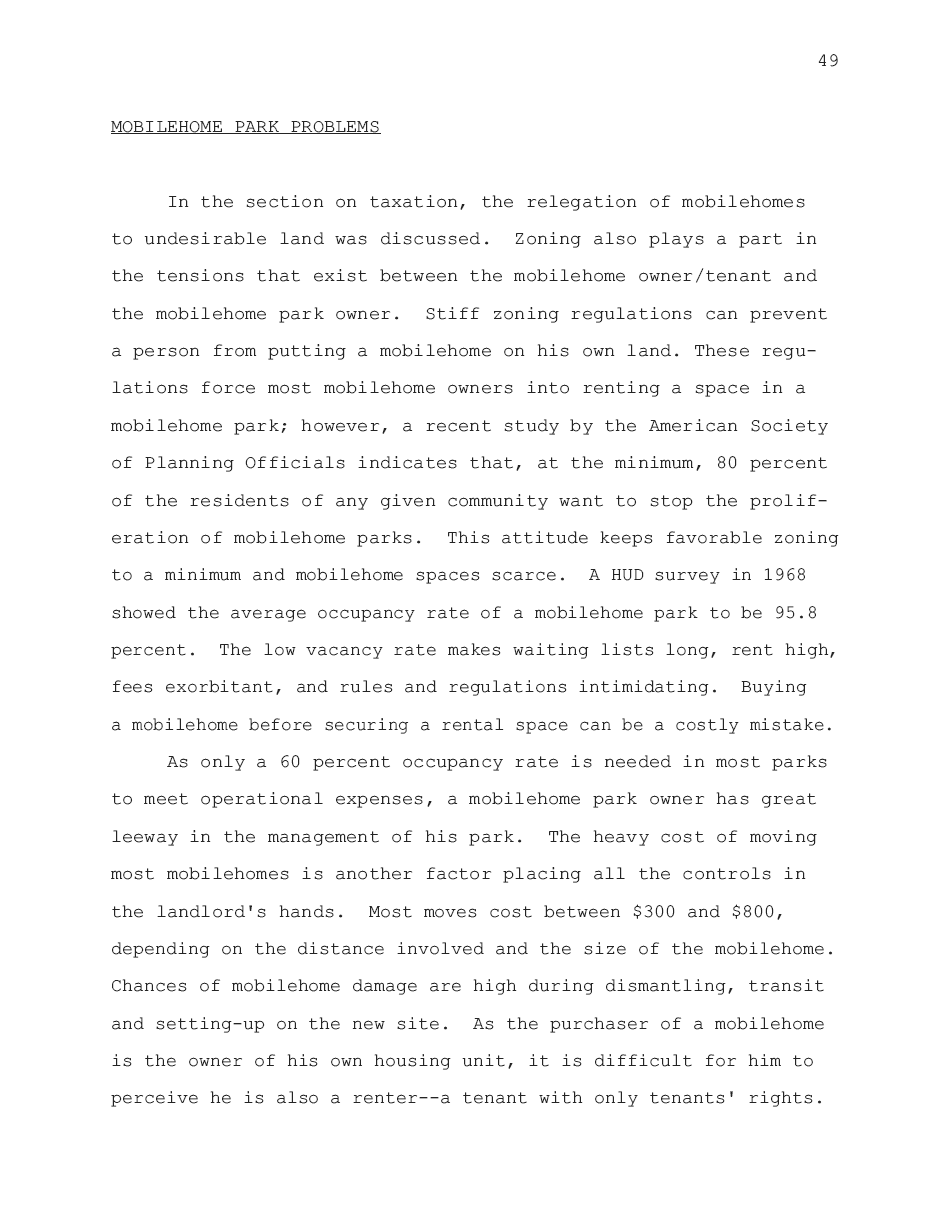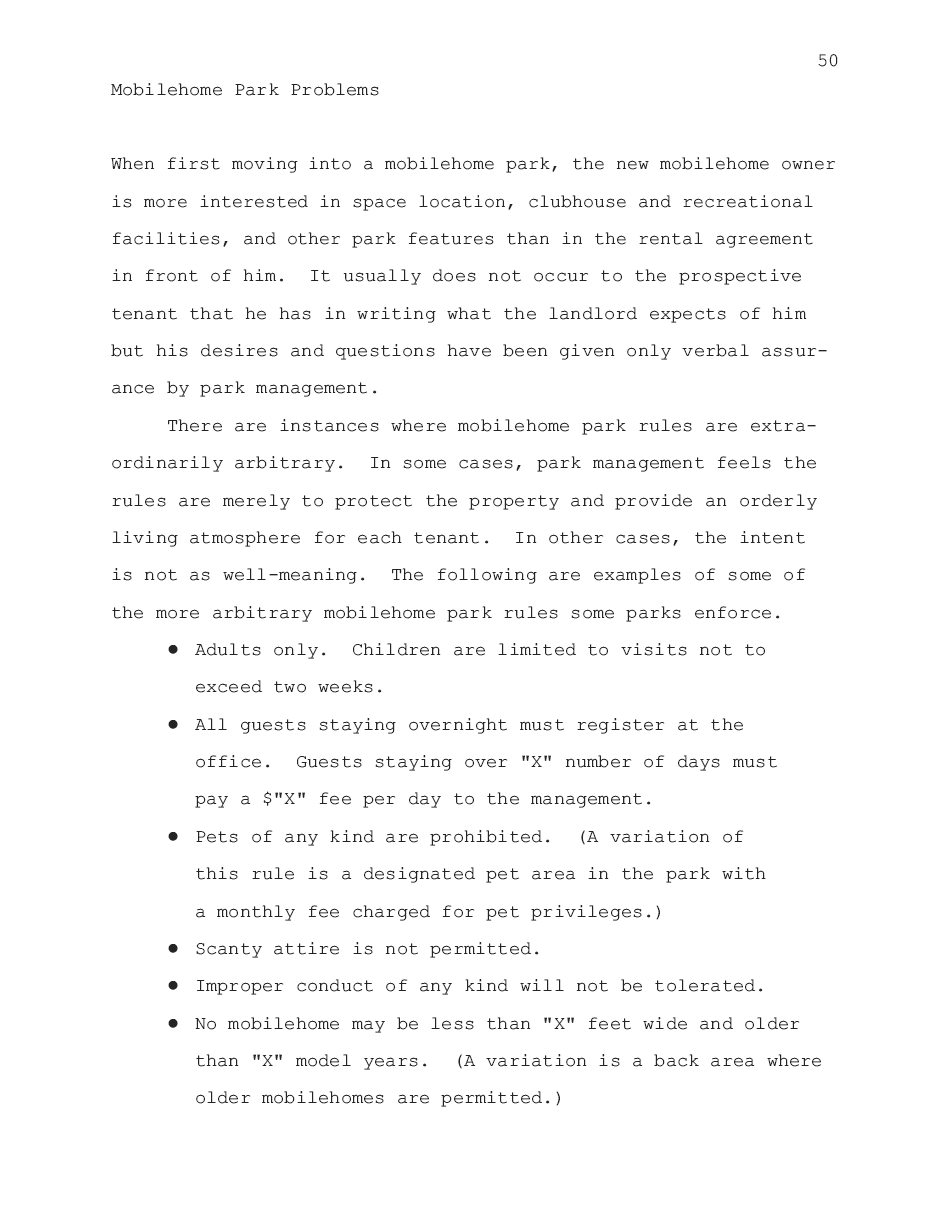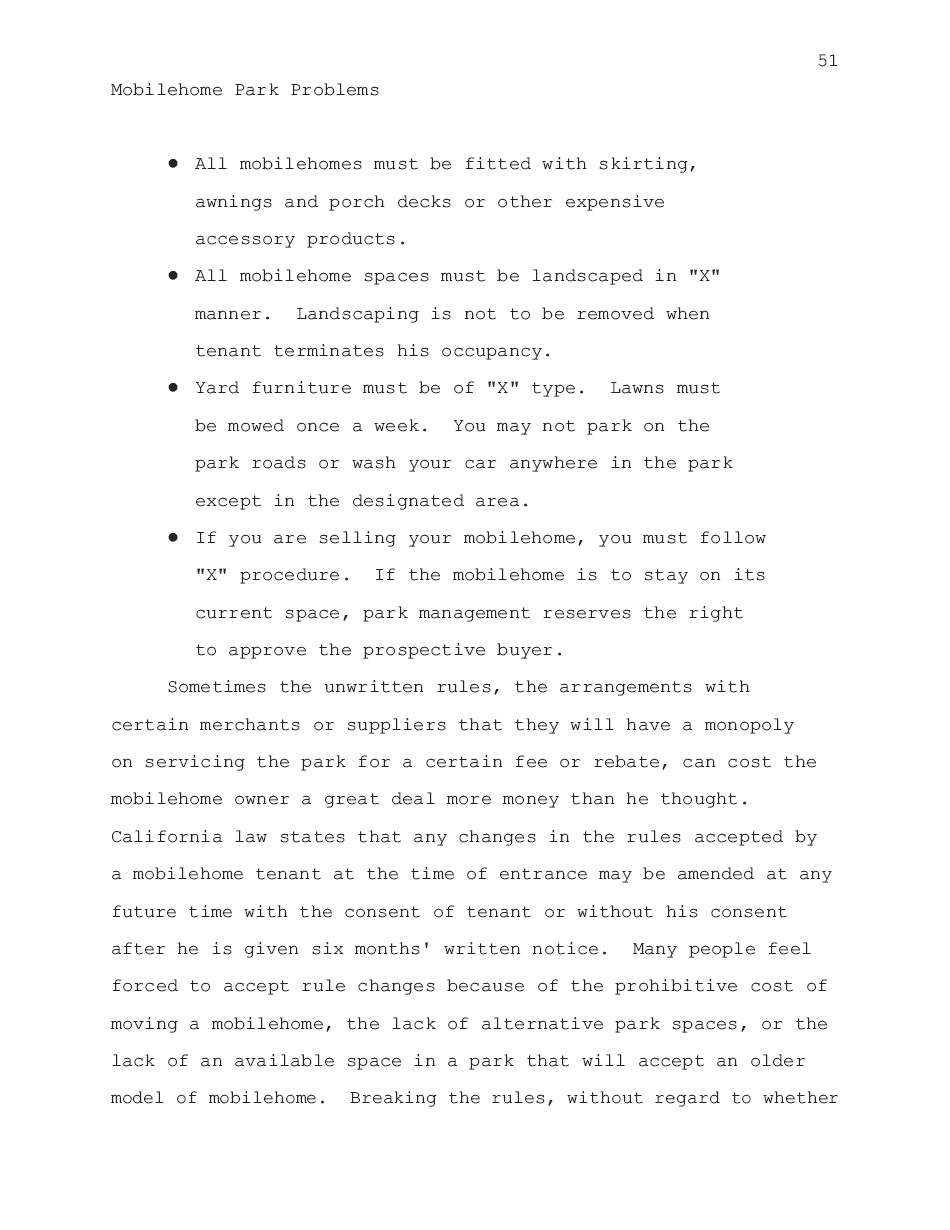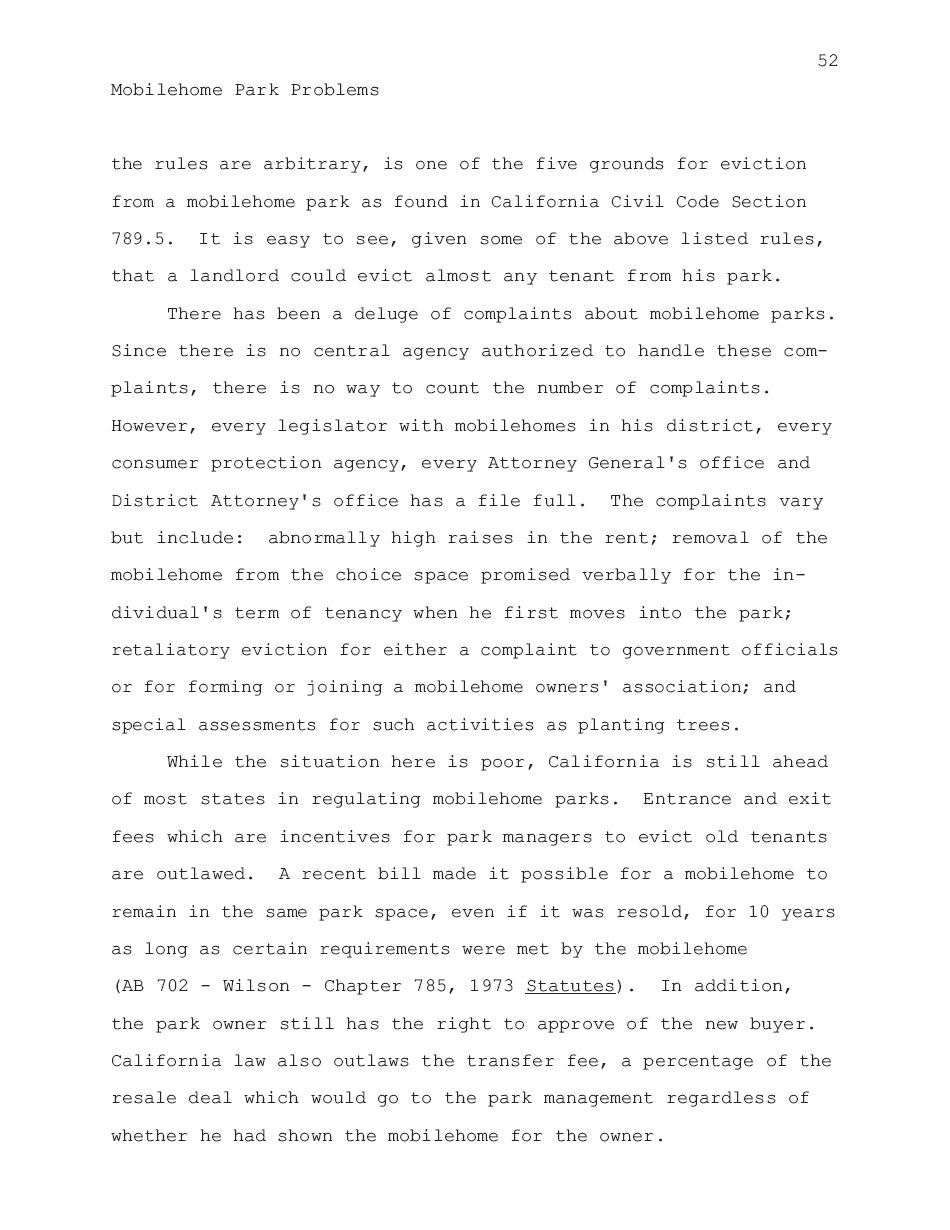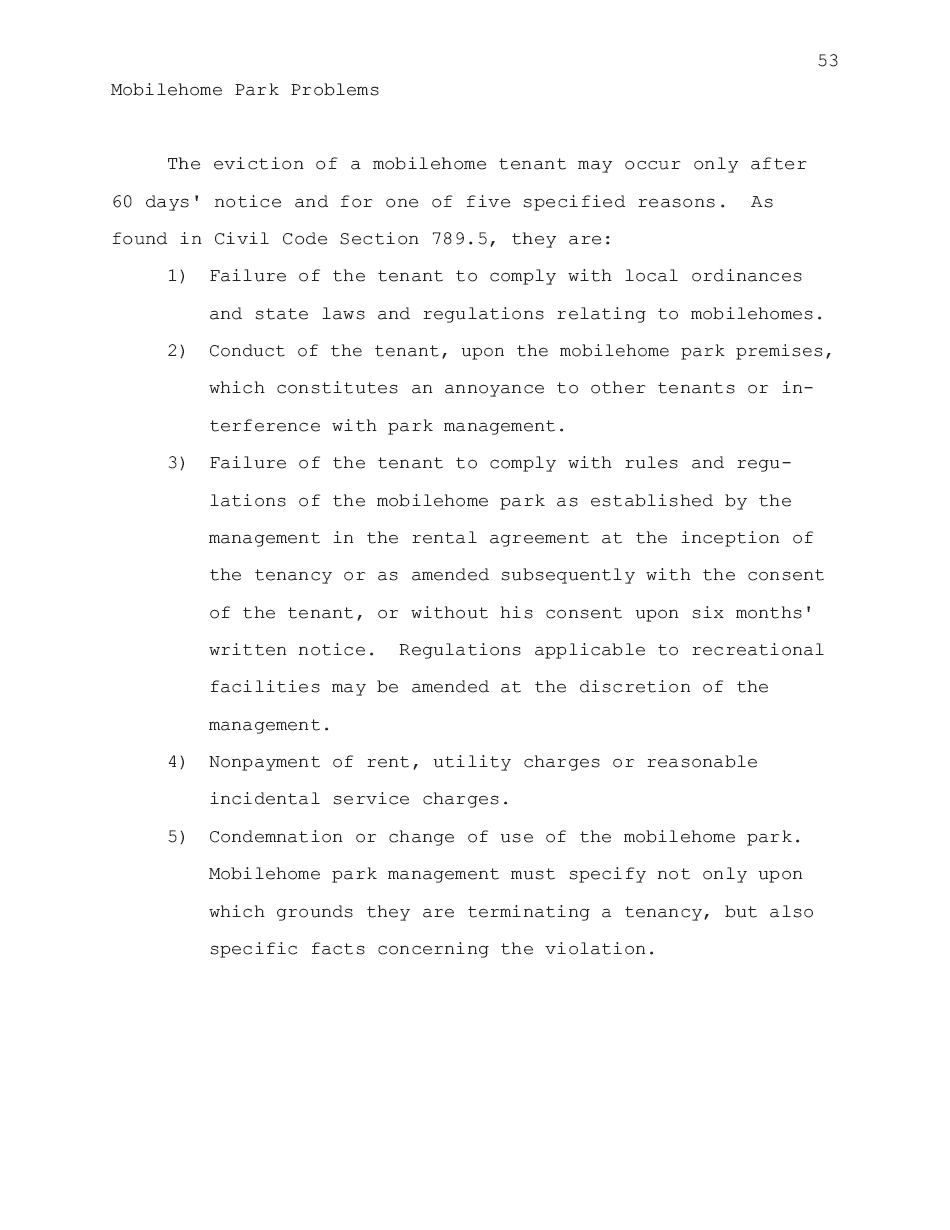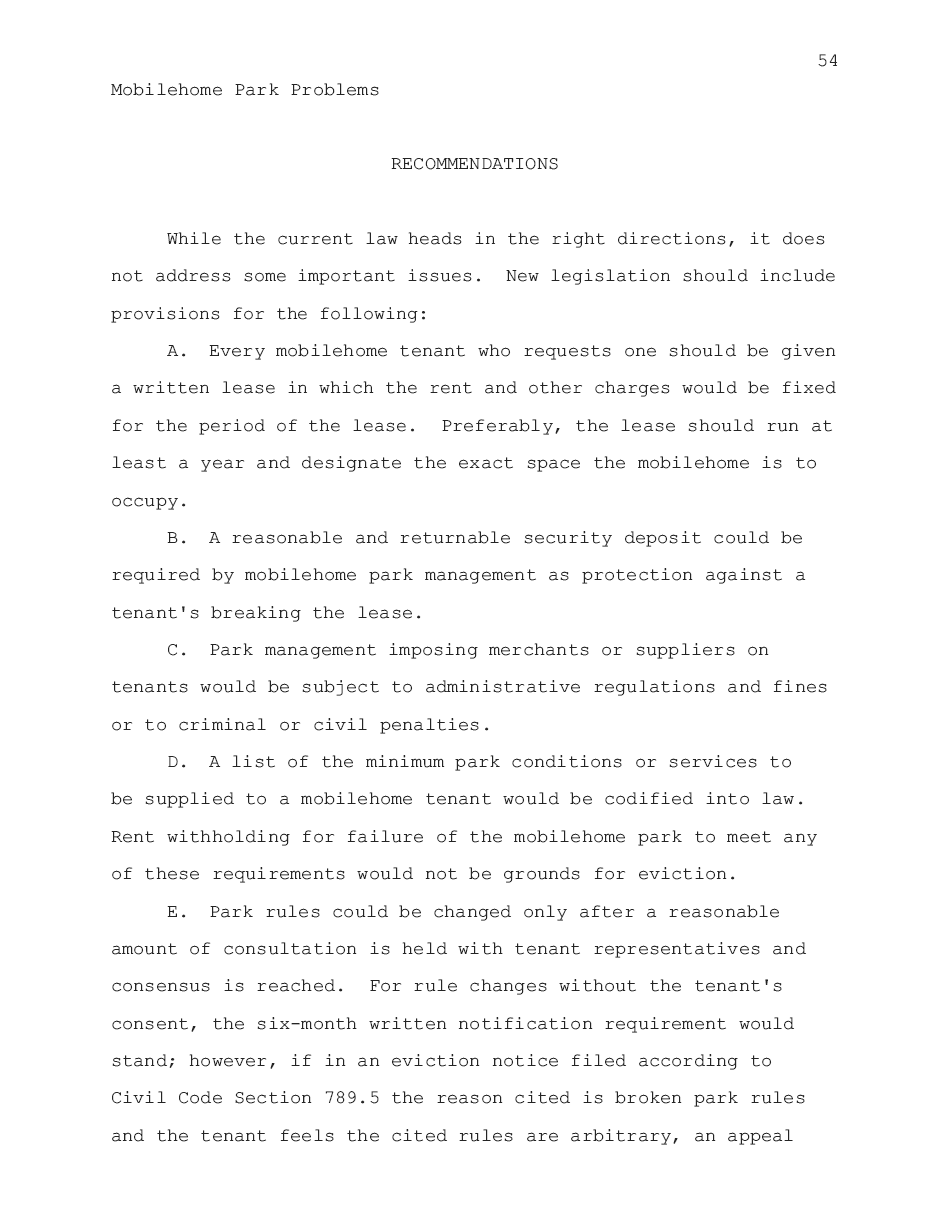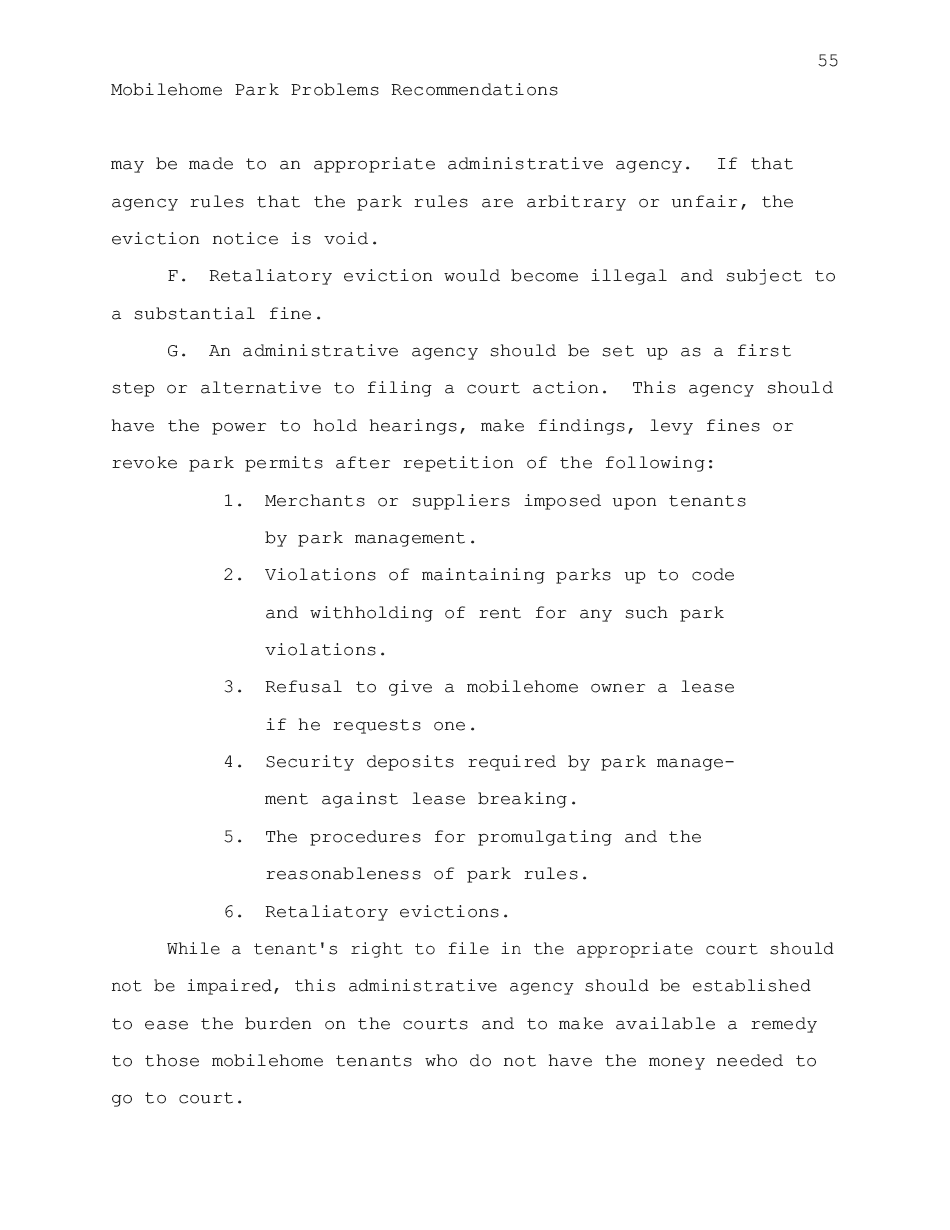1974 – A Million Californians Can’t Be Wronged
Mobilehome Park Problems
In the section on taxation, the relegation of mobilehomes to undesirable land was discussed. Zoning also plays a part in the tensions that exist between the mobilehome owner/tenant and the mobilehome park owner. Stiff zoning regulations can prevent a person from putting a mobilehome on his own land. These regulations force most mobilehome owners into renting a space in a mobilehome park; however, a recent study by the American Society of Planning Officials indicates that, at the minimum, 80 percent of the residents of any given community want to stop the proliferation of mobilehome parks. This attitude keeps favorable zoning to a minimum and mobilehome spaces scarce. A HUD survey in 1968 showed the average occupancy rate of a mobilehome park to be 95.8 percent. The low vacancy rate makes waiting lists long, rent high, fees exorbitant, and rules and regulations intimidating. Buying a mobilehome before securing a rental space can be a costly mistake.
As only a 60 percent occupancy rate is needed in most parks to meet operational expenses, a mobilehome park owner has great leeway in the management of his park. The heavy cost of moving most mobilehomes is another factor placing all the controls in the landlord’s hands. Most moves cost between $300 and $800, depending on the distance involved and the size of the mobilehome. Chances of mobilehome damage are high during dismantling, transit and setting-up on the new site. As the purchaser of a mobilehome is the owner of his own housing unit, it is difficult for him to perceive he is also a renter – a tenant with only tenants’ rights. When first moving into a mobilehome park, the new mobilehome owner is more interested in space location, clubhouse and recreational facilities, and other park features than in the rental agreement in front of him. It usually does not occur to the prospective tenant that he has in writing what the landlord expects of him but his desires and questions have been given only verbal assurance by park management.
There are instances where mobilehome park rules are extraordinarily arbitrary. In some cases, park management feels the rules are merely to protect the property and provide an orderly living atmosphere for each tenant. In other cases, the intent is not as well-meaning. The following are examples of some of the more arbitrary mobilehome park rules some parks enforce.
- Adults only. Children are limited to visits not to exceed two weeks.
- All guests staying overnight must register at the office. Guests staying over “X” number of days must pay a $“X” fee per day to the management.
- Pets of any kind are prohibited. (A variation of this rule is a designated pet area in the park with a monthly fee charged for pet privileges.)
- Scanty attire is not permitted.
- Improper conduct of any kind will not be tolerated.
- No mobilehome may be less than “X” feet wide and older than “X” model years. (A variation is a back area where older mobilehomes are permitted.)
- All mobilehomes must be fitted with skirting, awnings and porch decks or other expensive accessory products.
- All mobilehome spaces must be landscaped in “X” manner. Landscaping is not to be removed when tenant terminates his occupancy.
- Yard furniture must be of “X” type. Lawns must be mowed once a week. You may not park on the park roads or wash your car anywhere in the park except in the designated area.
- If you are selling your mobilehome, you must follow "X" procedure. If the mobilehome is to stay on its current space, park management reserves the right to approve the prospective buyer.
Sometimes the unwritten rules, the arrangements with certain merchants or suppliers that they will have a monopoly on servicing the park for a certain fee or rebate, can cost the mobilehome owner a great deal more money than he thought. California law states that any changes in the rules accepted by a mobilehome tenant at the time of entrance may be amended at any future time with the consent of tenant or without his consent after he is given six months’ written notice. Many people feel forced to accept rule changes because of the prohibitive cost of moving a mobilehome, the lack of alternative park spaces, or the lack of an available space in a park that will accept an older model of mobilehome. Breaking the rules, without regard to whether the rules are arbitrary, is one of the five grounds for eviction from a mobilehome park as found in California Civil Code Section 789.5. It is easy to see, given some of the above listed rules, that a landlord could evict almost any tenant from his park.
There has been a deluge of complaints about mobilehome parks. Since there is no central agency authorized to handle these complaints, there is no way to count the number of complaints. However, every legislator with mobilehomes in his district, every consumer protection agency, every Attorney General’s office and District Attorney’s office has a file full. The complaints vary but include: abnormally high raises in the rent; removal of the mobilehome from the choice space promised verbally for the individual’s term of tenancy when he first moves into the park; retaliatory eviction for either a complaint to government officials or for forming or joining a mobilehome owners’ association; and special assessments for such activities as planting trees.
While the situation here is poor, California is still ahead of most states in regulating mobilehome parks. Entrance and exit fees which are incentives for park managers to evict old tenants are outlawed. A recent bill made it possible for a mobilehome to remain in the same park space, even if it was resold, for 10 years as long as certain requirements were met by the mobilehome (AB 702 - Wilson - Chapter 785, 1973 Statutes). In addition, the park owner still has the right to approve of the new buyer. California law also outlaws the transfer fee, a percentage of the resale deal which would go to the park management regardless of whether he had shown the mobilehome for the owner.
The eviction of a mobilehome tenant may occur only after 60 days’ notice and for one of five specified reasons. As found in Civil Code Section 789.5, they are:
- Failure of the tenant to comply with local ordinances and state laws and regulations relating to mobilehomes.
- Conduct of the tenant, upon the mobilehome park premises, which constitutes an annoyance to other tenants or interference with park management.
- Failure of the tenant to comply with rules and regulations of the mobilehome park as established by the management in the rental agreement at the inception of the tenancy or as amended subsequently with the consent of the tenant, or without his consent upon six months’ written notice. Regulations applicable to recreational facilities may be amended at the discretion of the management.
- Nonpayment of rent, utility charges or reasonable incidental service charges.
- Condemnation or change of use of the mobilehome park. Mobilehome park management must specify not only upon which grounds they are terminating a tenancy, but also specific facts concerning the violation.
Mobilehome Park Problems – Recommendations
While the current law heads in the right directions, it does not address some important issues. New legislation should include provisions for the following:
- Every mobilehome tenant who requests one should be given a written lease in which the rent and other charges would be fixed for the period of the lease. Preferably, the lease should run at least a year and designate the exact space the mobilehome is to occupy.
- A reasonable and returnable security deposit could be required by mobilehome park management as protection against a tenant’s breaking the lease.
- Park management imposing merchants or suppliers on tenants would be subject to administrative regulations and fines or to criminal or civil penalties.
- A list of the minimum park conditions or services to be supplied to a mobilehome tenant would be codified into law. Rent withholding for failure of the mobilehome park to meet any of these requirements would not be grounds for eviction.
- Park rules could be changed only after a reasonable amount of consultation is held with tenant representatives and consensus is reached. For rule changes without the tenant’s consent, the six-month written notification requirement would stand; however, if in an eviction notice filed according to Civil Code Section 789.5 the reason cited is broken park rules and the tenant feels the cited rules are arbitrary, an appeal may be made to an appropriate administrative agency. If that agency rules that the park rules are arbitrary or unfair, the eviction notice is void.
- Retaliatory eviction would become illegal and subject to a substantial fine.
- An administrative agency should be set up as a first step or alternative to filing a court action. This agency should have the power to hold hearings, make findings, levy fines or revoke park permits after repetition of the following:
- Merchants or suppliers imposed upon tenants by park management.
- Violations of maintaining parks up to code and withholding of rent for any such park violations.
- Refusal to give a mobilehome owner a lease if he requests one.
- Security deposits required by park management against lease breaking.
- The procedures for promulgating and the reasonableness of park rules.
- Retaliatory evictions.
While a tenant’s right to file in the appropriate court should not be impaired, this administrative agency should be established to ease the burden on the courts and to make available a remedy to those mobilehome tenants who do not have the money needed to go to court.
Monday, March 11, 1974
Note: The content on this page was extracted from the PDF document titled “A Million Californians Can’t Be Wronged” pages 54-60 of 76.
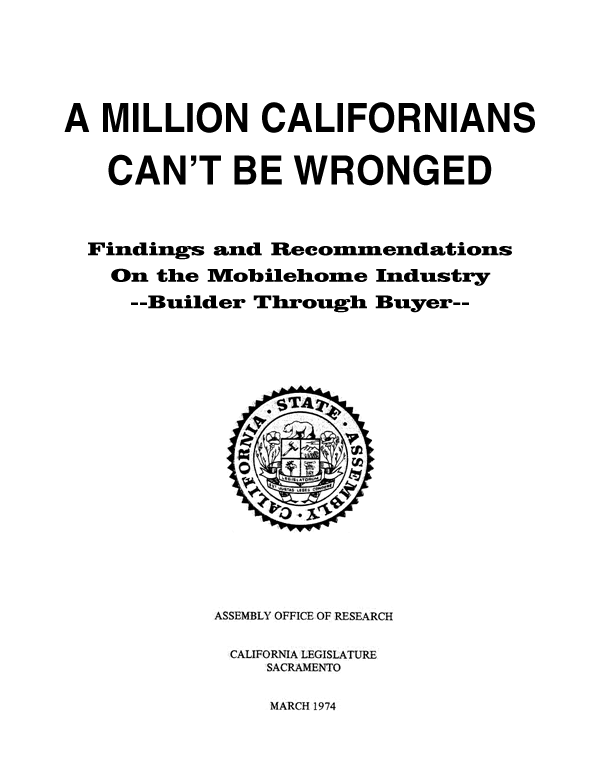
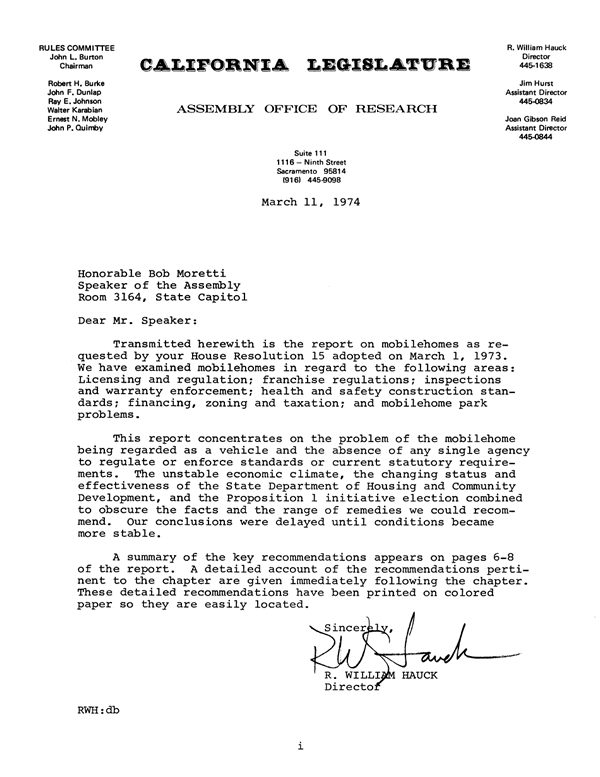
A Million Californians Can’t Be Wronged
File Type: PDF, Pages: 76, Size: 805KB
Mobilehome Park Problems
PDF Page Numbers 54-60 of 76
Mobilehome Park Problems – Pages 49-55
File Type: PDF, Pages: 7, Size: 33KB

